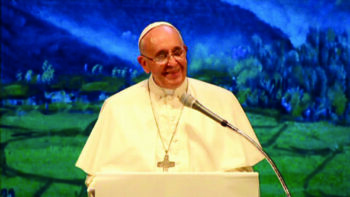World Day for Grandparents and the Elderly
 On 2 February we celebrate the feast of the Presentation of Jesus in the Temple, when Simeon and Anna, both elderly, enlightened by the Holy Spirit, recognised Jesus as the Messiah.
On 2 February we celebrate the feast of the Presentation of Jesus in the Temple, when Simeon and Anna, both elderly, enlightened by the Holy Spirit, recognised Jesus as the Messiah.
The Holy Spirit still stirs up thoughts and words of wisdom in the elderly today. Their voice is precious because it sings the praises of God and safeguards the roots of peoples. They remind us that old age is a gift and that grandparents are the link between generations, passing on the experience of life and faith to the young. Grandparents are often forgotten and we forget this wealth of preserving roots and passing on.
This is why, I have decided to establish World Day for Grandparents and the Elderly, which will be held throughout the Church every year on the fourth Sunday of July, close to the feast of Saints Joachim and Anne, the grandparents of Jesus.
It is important for grandparents to meet their grandchildren, and for grandchildren to meet their grandparents, because – as the prophet Joel says – grandparents, before their grandchildren, will dream (Joel 3:1), and young people, taking strength from their grandparents, will go forward and prophesy.
Angelus address, 31 January 2021
When I got really sick at the age of 21, I had my first experience of limit, of pain and loneliness. It changed the way I saw life. For months, I didn’t know who I was or whether I would live or die. The doctors had no idea whether I’d make it either. I remember hugging my mother and saying, “Just tell me if I’m going to die.” I was in the second year of training for the priesthood in the diocesan seminary of Buenos Aires.
I remember the date: 13 August 1957. I got taken to a hospital by a prefect who realised mine was not the kind of flu you treat with aspirin. Straightaway they took a litre and a half of water out of my lungs, and I remained there fighting for my life. The following November they operated to take out the upper right lobe of one of the lungs. I have some sense of how people with Covid-19 feel as they struggle to breathe on a ventilator.
I remember especially two nurses from this time. One was the senior ward matron, a Dominican sister who had been a teacher in Athens before being sent to Buenos Aires. I learned later that following the first examination by the doctor, after he left, she told the nurses to double the dose of medication he had prescribed -- basically penicillin and streptomycin -- because she knew from experience I was dying. Sister Cornelia Caraglio saved my life. Because of her regular contact with sick people, she understood better than the doctor what they needed, and she had the courage to act on her knowledge.
Another nurse, Micaela, did the same when I was in intense pain, secretly prescribing me extra doses of painkillers outside my due times. Cornelia and Micaela are in heaven now, but I’ll always owe them so much. They fought for me to the end, until my eventual recovery. They taught me what it is to use science, but also to know when to go beyond it to meet particular needs. And the serious illness I lived through taught me to depend on the goodness and wisdom of others.
This theme of helping others has stayed with me these past months. In lockdown I’ve often gone in prayer to those who sought all means to save the lives of others. So many of the nurses, doctors and caregivers paid that price of love, together with priests, and religious and ordinary people whose vocations were service. We return their love by grieving for them and honouring them.
Whether or not they were conscious of it, their choice testified to a belief: that it is better to live a shorter life serving others than a longer one resisting that call.
They are the antibodies to the virus of indifference. They remind us that our lives are a gift and we grow by giving of ourselves, not preserving ourselves, but losing ourselves in service.
From Pope Francis’ new book,
Let Us Dream: the Path to a Better Future,
written with Austin Ivereigh
 Entries(RSS)
Entries(RSS)